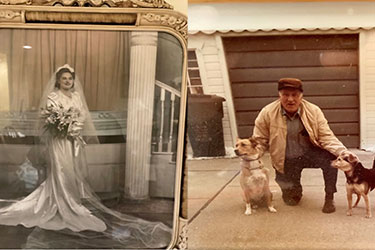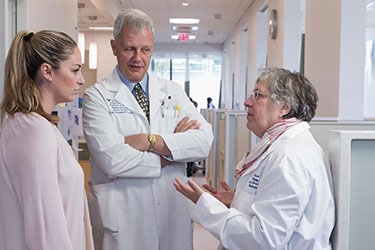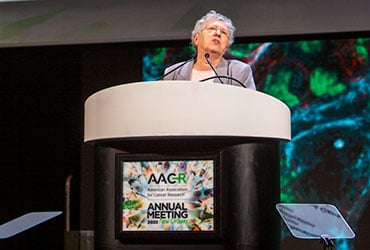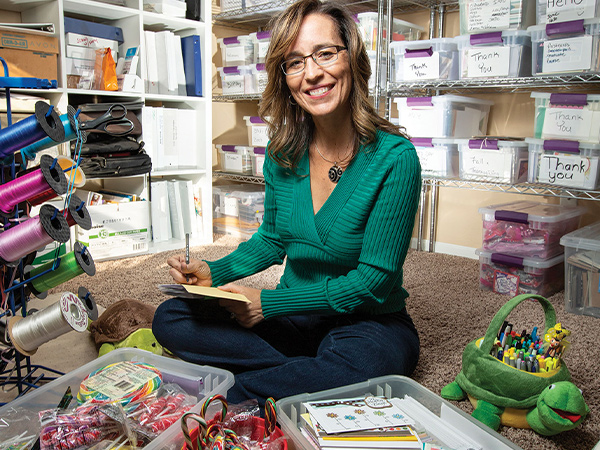Translating Personal Tragedy Into the Search for New Cancer Therapeutics
Dr. Patricia LoRusso’s parents Both died of cancer when she was a teenager, inspiring her to become an oncologist and focus on developing new treatments for people with cancer.
Patricia LoRusso, DO, deals with the complexities of cancer as a medical oncologist and expert in experimental therapeutics at Yale Cancer Center. Her accomplishments in the early evaluation of new anticancer treatments were recognized by the AACR with a prestigious award at its Annual Meeting 2022.
Her career as a doctor and scientist has been long and satisfying. But her fundamental view of cancer is simple.
“I always look at cancer as my enemy,” she says. “It’s been my enemy for many, many years.”
Dr. LoRusso’s enmity for cancer goes back to her youth, when both her mother and her father developed cancer and died when she was a teenager, something she still recalls with a catch in her voice.
“When my parents were sick, there were no drugs to treat their cancers,” she remembers.
“When my mother died, and then subsequently my father died, both of cancer, literally before I graduated from high school, I realized that I could use that as either a curse or a gift,” she says. “What I decided to do was use it as a gift and use their deaths from cancer as a nidus to focus my career. Therefore, since I was young, I wanted to be a medical oncologist.”

In those days, not everyone in her life shared her vision. Her high school counselor, for one, who assured her that women didn’t become doctors—they became nurses. Nothing daunted, Dr. LoRusso obtained a bachelor’s degree in biology from Marygrove College in her hometown of Detroit and her medical degree from Michigan State University.
After residency and a fellowship, Dr. LoRusso joined Wayne State University’s Barbara Karmanos Cancer Institute, where she developed a focus on breast cancer and other solid tumors.
“One in eight women at minimum in this country will get breast cancer, and we don’t know why,” she says. “So it’s pivotal that we find good drugs.”
Bringing therapeutics to market is a complex process that begins with basic research in the laboratory and proceeds through “translational” work in the clinic, through a series of carefully controlled trials.
At Karmanos, Dr. LoRusso became director of the phase I clinical trials program, organizing the initial level of inpatient trials of newly developed therapies and recruiting patients into them. These included medicines for breast cancer and many other malignancies.
“Although I’ve developed drugs for breast cancer, I’ve also developed drugs for a lot of other diseases as well,” she says. “But I like to focus on the translational components. Obviously, I’ve dealt with a lot of drugs that never made it anywhere because, in the lab or even in the clinic, they just didn’t do what we had hoped they would do based on the preliminary science of the disease.”

Photo courtesy Yale Cancer Center
“But I think it’s not good enough to just put patients on trials,” she adds, “although it’s very important because that’s the only way we’re going to make clinical discoveries that are going to advance therapeutic interventions for our patients. It’s equally, if not more, important to understand why the drugs work, and also, sometimes even more important than why they work, why they don’t work.”
After 17 years at Karmanos, Dr. LoRusso moved to Yale Cancer Center in New Haven, Connecticut, where she is now the associate cancer center director for experimental therapeutics. The program is currently running more than 60 phase I clinical trials, taking different approaches to a wide variety of cancers.
“A lot of the drugs are now more selective for specific tumor types,” she says. “We need to have a large portfolio to be able to service a large number of patients with different tumor types and different scenarios. If you have a drug in your early pipeline that targets a specific mutation, it offers patients another therapeutic option that potentially could be as good if not better than the typical standard of care.”
The AACR recently recognized Dr. LoRusso’s accomplishments as a trialist with its AACR-Joseph H. Burchenal Award for Outstanding Achievement in Clinical Cancer Research.
“Her unwavering and inexhaustible efforts in the design, conduct, analysis, and knowledge dissemination of early-phase cancer clinical trials have created paradigm shifts in the treatment of cancer,” the award citation read.
In addition to being an honoree, Dr. LoRusso is a longtime active member of AACR, having served on committees and the Board of Directors. She sees the AACR as a focal point in the battle against cancer.

“Many people often ask me, ‘why AACR? Why are you so interested in AACR and so engaged in AACR?’ I find AACR a pivotal force, helping to bring the full spectrum of cancer research together under one organization.”
Basic and translational scientists participate in AACR, she notes, working together to bring forward the latest scientific findings.
“If we’re really going to advance the science into the clinic, and if we’re really going to make a difference in the treatment of our patients and hopefully one day lead to cures where there are none,” she says, “it’s absolutely important, it’s pivotal that we bring the spectrum of our research together under one organization and move it forward together.”
Just as she is motivated by the memory of her parents and their struggles with cancer, Dr. LoRusso draws inspiration from the people she helps as a doctor.
“The greatest teachers that I have had along the way have been my patients, and they’ve been the fuel that has kept me going,” she says.

